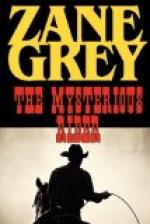Next Wade unrolled his bed under the spruce, with one end of the tarpaulin resting on the soft mat of needles. On top of that came the two woolly sheepskins, which he used to lie upon, then his blankets, and over all the other end of the tarpaulin.
This ended his tasks for the day. He lighted his pipe and composed himself beside the camp-fire to smoke and rest awhile before going to bed. The silence of the wilderness enfolded lake and shore; yet presently it came to be a silence accentuated by near and distant sounds, faint, wild, lonely—the low hum of falling water, the splash of tiny waves on the shore, the song of insects, and the dismal hoot of owls.
“Bill Belllounds—an’ he needs a hunter,” soliloquized Bent Wade, with gloomy, penetrating eyes, seeing far through the red embers. “That will suit me an’ change my luck, likely. Livin’ in the woods, away from people—I could stick to a job like that.... But if this White Slides is close to the old trail I’ll never stay.”
He sighed, and a darker shadow, not from flickering fire, overspread his cadaverous face. Eighteen years ago he had driven the woman he loved away from him, out into the world with her baby girl. Never had he rested beside a camp-fire that that old agony did not recur! Jealous fool! Too late he had discovered his fatal blunder; and then had begun a search over Colorado, ending not a hundred miles across the wild mountains from where he brooded that lonely hour—a search ended by news of the massacre of a wagon-train by Indians.
That was Bent Wade’s secret.
And no earthly sufferings could have been crueler than his agony and remorse, as through the long years he wandered on and on. The very good that he tried to do seemed to foment evil. The wisdom that grew out of his suffering opened pitfalls for his wandering feet. The wildness of men and the passion of women somehow waited with incredible fatality for that hour when chance led him into their lives. He had toiled, he had given, he had fought, he had sacrificed, he had killed, he had endured for the human nature which in his savage youth he had betrayed. Yet out of his supreme and endless striving to undo, to make reparation, to give his life, to find God, had come, it seemed to Wade in his abasement, only a driving torment.
But though his thought and emotion fluctuated, varying, wandering, his memory held a fixed and changeless picture of a woman, fair and sweet, with eyes of nameless blue, and face as white as a flower.
“Baby would have been—let’s see—’most nineteen years old now—if she’d lived,” he said. “A big girl, I reckon, like her mother.... Strange how, as I grow older, I remember better!”
The night wind moaned through the spruces; dark clouds scudded across the sky, blotting out the bright stars; a steady, low roar of water came from the outlet of the lake. The camp-fire flickered and burned out, so that no sparks blew into the blackness, and the red embers glowed and paled and crackled. Wade at length got up and made ready for bed. He threw back tarpaulin and blankets, and laid his rifle alongside where he could cover it. His coat served for a pillow and he put the Colt’s gun under that; then pulling off his boots, he slipped into bed, dressed as he was, and, like all men in the open, at once fell asleep.




